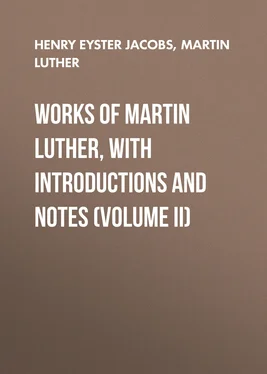Henry Eyster Jacobs - Works of Martin Luther, with Introductions and Notes (Volume II)
Здесь есть возможность читать онлайн «Henry Eyster Jacobs - Works of Martin Luther, with Introductions and Notes (Volume II)» — ознакомительный отрывок электронной книги совершенно бесплатно, а после прочтения отрывка купить полную версию. В некоторых случаях можно слушать аудио, скачать через торрент в формате fb2 и присутствует краткое содержание. Жанр: foreign_prose, foreign_religion, Философия, foreign_psychology, foreign_antique, на немецком языке. Описание произведения, (предисловие) а так же отзывы посетителей доступны на портале библиотеки ЛибКат.
- Название:Works of Martin Luther, with Introductions and Notes (Volume II)
- Автор:
- Жанр:
- Год:неизвестен
- ISBN:нет данных
- Рейтинг книги:3 / 5. Голосов: 1
-
Избранное:Добавить в избранное
- Отзывы:
-
Ваша оценка:
- 60
- 1
- 2
- 3
- 4
- 5
Works of Martin Luther, with Introductions and Notes (Volume II): краткое содержание, описание и аннотация
Предлагаем к чтению аннотацию, описание, краткое содержание или предисловие (зависит от того, что написал сам автор книги «Works of Martin Luther, with Introductions and Notes (Volume II)»). Если вы не нашли необходимую информацию о книге — напишите в комментариях, мы постараемся отыскать её.
Works of Martin Luther, with Introductions and Notes (Volume II) — читать онлайн ознакомительный отрывок
Ниже представлен текст книги, разбитый по страницам. Система сохранения места последней прочитанной страницы, позволяет с удобством читать онлайн бесплатно книгу «Works of Martin Luther, with Introductions and Notes (Volume II)», без необходимости каждый раз заново искать на чём Вы остановились. Поставьте закладку, и сможете в любой момент перейти на страницу, на которой закончили чтение.
Интервал:
Закладка:
18. When we are justly and deservedly put under the ban our chief concern should be to correct the sins of commission and omission which caused the ban, since the ban always is imposed on account of sin (which is far worse than the ban itself), and yet here as elsewhere things are perverted, so that we only consider how much the rod hurts and not why we are punished. Where can you find men to-day who are as much in fear of sinning and provoking God as they are in fear of the ban? Thus it happens that we are more in fear of the wholesome chastisement than of the heinous sins. We must let men think and act thus, because the natural man does not see the spiritual harm in sin as he feels the smarts of chastisement; although the fear of the ban has also been exaggerated by the tyrannous methods and threatenings of the spiritual judges who drive the people to fear punishment more than sin.
When, however, we are unjustly put under the ban, we should be very careful that we in no way do, omit, say or withhold that on account of which we are under the ban (unless we cannot do so without sin and without injury to our neighbor) 72 72 Again an important limitation.
, but rather should we endure the ban in humility, die happily under it, if it cannot be otherwise, and not be terrified, even though we do not receive the sacrament and are buried in unconsecrated ground. The reason is this: Truth and righteousness belong to the inner, spiritual fellowship 73 73 See above, p. 41.
and may not be abandoned under penalty of falling under God's eternal ban. Therefore they dare not be surrendered for the sake of the external fellowship, which is immeasurably inferior, nor because of the ban. To receive the sacrament and to be buried in consecrated ground are of too little consequence that or their sake truth and righteousness be neglected. And that no one may think this strange I will go further and say that even he who dies under a just ban is not damned, unless indeed he did not repent of his sin or despised the ban. For sorrow and repentance make all things right, even though his body be exhumed or his ashes cast into the water 74 74 The ashes of Hus were cast into the Rhine (1415), and the body of Wycliff was exhumed and cremated and the ashes cast into the water (1427).
.
19. The unjust ban then is much more to be desired than either the just ban or the external fellowship. It is a very precious merit in the sight of God, and blessed is he who dies under an unjust ban. God will grant him an eternal crown for the truth's sake, on account of which he is under the ban. Then let him sing in the words of Psalm cix, "They have cursed me, but Thou hast blessed me." [Ps. 109:28] Only let us beware of despising the authorities, and humbly declare our innocence; if this does not avail, then we are free and without guilt in the sight of God. For if we are in duty bound by the commandment of Christ to agree with our adversary [Matt. 5:25]; how much more should we agree with the authority of the Christian Church, be it exercised justly or unjustly, by worthy or unworthy rulers.
An obedient child, though it does not deserve the punishment it receives from its mother, suffers no harm from the unjust chastisement, nay, by its very patience it becomes much dearer and more pleasing to the mother; how much more do we become lovable in God's sight, if at the hands of evil rulers we endure the unmerited punishment of the Church, as our spiritual mother. For the Church remains our mother because Christ remains Christ, and she is not changed into a step-mother simply because of our evil rulers. Nevertheless, the prelates and bishops and their officials should be temperate and not hastily use the ban, for many bans means nothing else than many laws and commandments, and prescribing many laws is to set many snares for poor souls. And so by numerous ill-advised bans nothing more results than great offence and an occasion or sin, by which the wrath of God is provoked, although the ban was ordained to reconcile Him. And although we are truly bound to obey them, still more are they bound to direct, change and regulate their decree and authority according to our ability and need and for our correction and salvation; for we have shown from St. Paul 75 75 See above, p. 42.
that power is given not for destruction but for edification [2 Cor. 13:10].
20. The ban should be applied not only to heretics and schismatics, but to all who are guilty of open sin, as we have shown above from St. Paul, who commands that the railer, extortioner, fornicator and drunkard be put under the ban [1 Cor. 5:11]. But in our day such sinners are let in peace, especially if they are bigwigs; and to the disgrace of this noble form of authority, the ban is used only for the collection of debts of money, often so insignificant that the costs amount to more than the original debt. In order to gloss this over they have hit upon a new device, saying they put under the ban not because of debt but because of disobedience, because the summons was not respected; were it not for debt, however, they would forget the disobedience, as we see when many other sins, even their own, escape the ban. A poor man must often be disobedient if he is cited to go so many miles, lose time and money and neglect his trade. It is utter tyranny to summon a man to come such a distance across country to court.
And I commend the temporal princes 76 76 In 1518 both George and Frederick of Saxony took the position that spiritual jurisdiction should be limited to spiritual matters. Gess, Akten und Briefe zur Kirchen politik Georgs 1, 44.
who will not permit the ban and the abuses connected with it in their lands and among their people. What are princes and counsellors for if they do not concern themselves with and judge such temporal matters as debts, each in their city and province and among their subjects? The spiritual powers should be concerned with the Word of God, with sin, and with the devil, in order to bring souls to God, and should relinquish temporal cases to the temporal judges, as Paul writes 77 77 Luther puts a peculiar construction upon this passage.
[1 Cor. 6:1]. Indeed, as things are now, it is almost necessary to use the ban in order to drive the people into the Church and not out of it.
21. Whether one be justly or unjustly under the ban, no one may exclude him from the Church until the Gospel has been read or the sermon preached 78 78 The ancient service was divided into the service of the Word ( missa catechumenorum ) and the celebration of the sacrament ( missa fidelium ); before the second, those under the ban as well as the catechumens were required to withdraw.
. For from the hearing of the Gospel and the sermon no one shall or can exclude or be excluded. The hearing of the Word of God should remain free to every one 79 79 The "great ban" excluded from all services.
. Nay, those who are under a just ban ought most of all to hear it, that they may perchance be moved by it to acknowledge their sin and to reform. We read that it was the ancient practice of the Church to dismiss those under the ban after the sermon, and if a whole congregation were under the ban the sermon must be allowed to proceed just as though there were no ban. In addition, even though he who is under the ban may not remain for the mass after the sermon, nor come to the sacrament 80 80 According to Roman Catholic usage there is a distinction between hearing mass and receiving the sacrament.
, nevertheless he should not neglect it, but spiritually come to the sacrament, that is, he should heartily desire it and believe that he can spiritually receive it, as was said in the treatise on the sacrament 81 81 Compare Treatise Concerning the Blessed Sacrament, above, p. 25.
.
Интервал:
Закладка:
Похожие книги на «Works of Martin Luther, with Introductions and Notes (Volume II)»
Представляем Вашему вниманию похожие книги на «Works of Martin Luther, with Introductions and Notes (Volume II)» списком для выбора. Мы отобрали схожую по названию и смыслу литературу в надежде предоставить читателям больше вариантов отыскать новые, интересные, ещё непрочитанные произведения.
Обсуждение, отзывы о книге «Works of Martin Luther, with Introductions and Notes (Volume II)» и просто собственные мнения читателей. Оставьте ваши комментарии, напишите, что Вы думаете о произведении, его смысле или главных героях. Укажите что конкретно понравилось, а что нет, и почему Вы так считаете.












